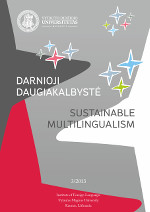Les difficultés d’apprentissage du verbe français devoir chez l’apprenant lituanien. Analyse et solutions possibles
Problematic Use of the French Verb Devoir. Recommendations to Lithuanian Students
Author(s): Vita ValiukienėSubject(s): Foreign languages learning
Published by: Vytauto Didžiojo Universitetas
Keywords: authenticity; fictional text; modality (alethic; deontic; epistemic); polysemy; corpus
Summary/Abstract: The article discusses the semantic potential of meanings of the French verb devoir. The research draws on insights of C. Barbet, P. Dendal and C. Vetters and illustrates the discussion on the verb devoir with examples from a parallel corpus (CTL FR→LT, CTL LT→FR) that consists of original literary works and their translations into Lithuanian and French. The analysis of sentences, which have been translated from Lithuanian fiction to French by students who are studying French as a foreign language at Vilnius University and have participated in the research, shows that the students use the verb devoir to express obligation. Lithuanian verbs that mean necessity, such as gauti, privalėti, tekti, reikėti and others, usually become equivalents of devoir a s w ell. The translation analysis of Lithuanian galbūt, tikriausiai and turbūt shows that Lithuanian students chotose to adopt the same strategy and usually use adverbs peut-être and probablement. The meanings of probability and possibility, which devoir may contain, are rarely expressed with the help of devoir in translations from Lithuanian to French. In order to avoid such interferential mistakes and develop receptive skills of French, the author of this publication suggests analysing a fictional literary text as an authentic and polyphonic document and using translation not only in language teaching and learning but also in the evaluation of the progress of the latter. This method may help to learn and use this polysemous verb (devoir) correctly.
Journal: Darnioji daugiakalbystė
- Issue Year: 2013
- Issue No: 3
- Page Range: 98-110
- Page Count: 13
- Language: French

